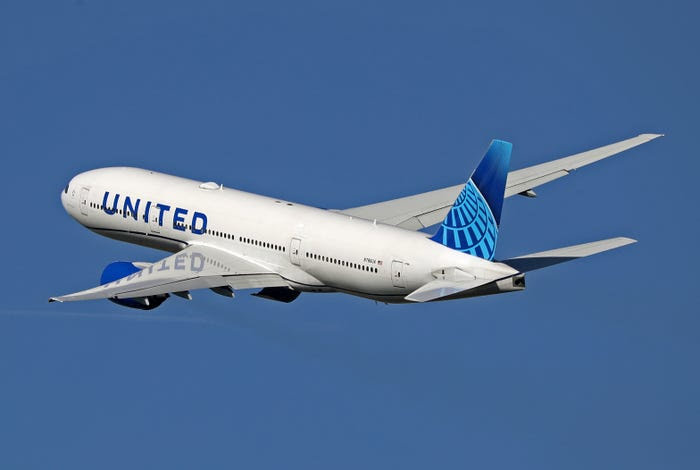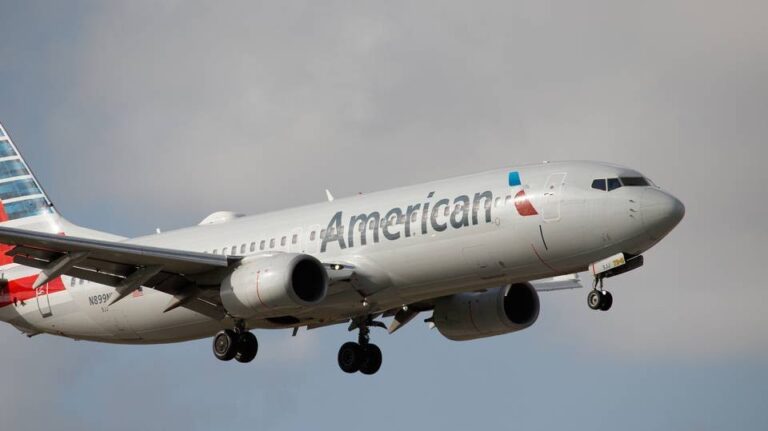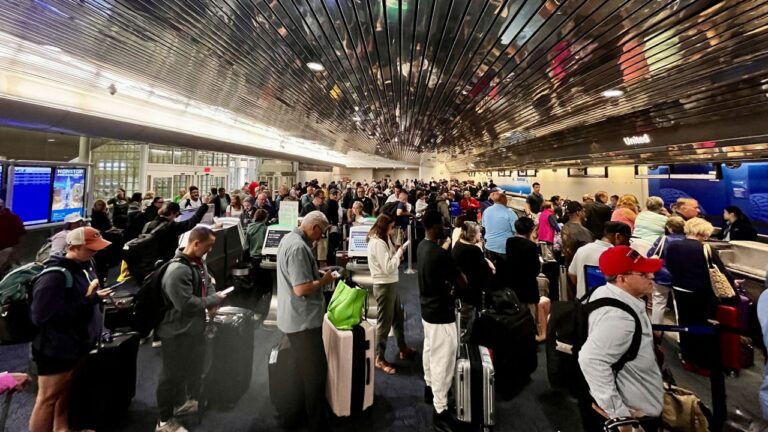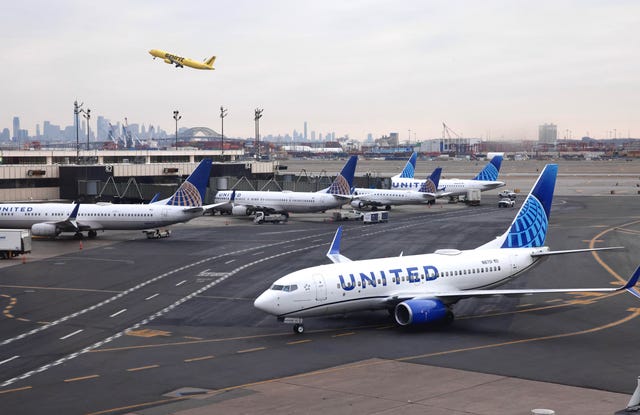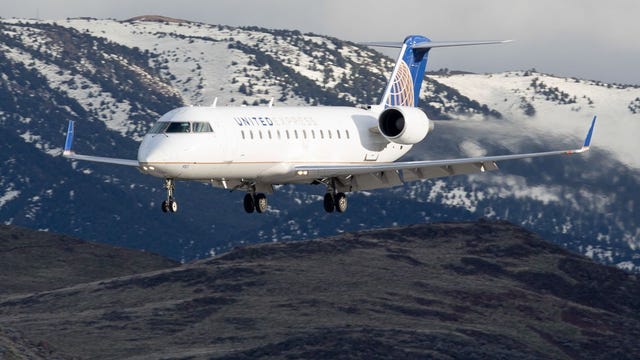United and American Airlines warned pilots they could struggle to communicate due to massive IT outage
United and American Airlines warned pilots they could struggle to communicate due to massive IT outageMajor airlines warned pilots they may be unable to communicate with ground services amid an IT outage that canceled thousands of flights.
American Airlines and United Airlines issued advisories to be relayed to the carriers’ airborne flights early Friday morning.
They said communication was intermittent as they were experiencing issues with systems such as the Aircraft Communications Addressing and Reporting System, or ACARS, which transmits messages to planes typically from air traffic control or airline operations.
Major airlines, banks, and supermarkets are experiencing widespread disruptions because of an IT outage after Microsoft reported problems with its online services, linked to an issue at the cybersecurity firm CrowdStrike.American, United, and Delta Air Lines — the big three of US carriers — all issued ground stops on Friday, citing a communication issue. They affected all flights regardless of destination.
According to data from Cirium, 2,691 flights had been canceled around the world by 8 a.m. ET.
In the US, about 4.2% of flights were canceled — significantly higher than usual for that point in the morning.
137 United flights were canceled, and 307 American ones, but Delta appeared to be most affected, with 508 canceled flights — equivalent to around 10%.
Just 62% of flights were departing on time, the Cirium data also showed.
American and Delta canceled their ground stops around 5:10 a.m. ET and 7:50 a.m. ET, respectively.
In a statement to Business Insider, United said, “A third-party software outage is impacting computer systems worldwide, including at United.
“While we work to restore those systems, we are holding all aircraft at their departure airports. Flights already airborne are continuing to their destinations.”
United and America warned pilots that communication was intermittent.
Several industries have been disrupted by an IT outage linked to CrowdStrike.
Sign up to get the inside scoop on today’s biggest stories in markets, tech, and business — delivered daily. Read preview
Major airlines warned pilots they may be unable to communicate with ground services amid an IT outage that canceled thousands of flights.
American Airlines and United Airlines issued advisories to be relayed to the carriers’ airborne flights early Friday morning.
They said communication was intermittent as they were experiencing issues with systems such as the Aircraft Communications Addressing and Reporting System, or ACARS, which transmits messages to planes typically from air traffic control or airline operations.
Major airlines, banks, and supermarkets are experiencing widespread disruptions because of an IT outage after Microsoft reported problems with its online services, linked to an issue at the cybersecurity firm CrowdStrike.
American, United, and Delta Air Lines — the big three of US carriers — all issued ground stops on Friday, citing a communication issue. They affected all flights regardless of destination.
According to data from Cirium, 2,691 flights had been canceled around the world by 8 a.m. ET.
In the US, about 4.2% of flights were canceled — significantly higher than usual for that point in the morning.
137 United flights were canceled, and 307 American ones, but Delta appeared to be most affected, with 508 canceled flights — equivalent to around 10%.
Just 62% of flights were departing on time, the Cirium data also showed.
American and Delta canceled their ground stops around 5:10 a.m. ET and 7:50 a.m. ET, respectively.
In a statement to Business Insider, United said, “A third-party software outage is impacting computer systems worldwide, including at United.
“While we work to restore those systems, we are holding all aircraft at their departure airports. Flights already airborne are continuing to their destinations.”
Allegiant Air, Frontier Airlines, and Spirit Airlines also issued ground stops but these too were later canceled.
Around 8 a.m. Delta said on X that it had resumed some flight departures but additional delays and cancellations are expected.
“We have been able to safely re-establish our operation,” American said in a post.
The IT outage has caused chaos at airports. Whiteboards were used to display flight information in Belfast and Singapore, while some airline staff handwrote boarding passes.
Overview of the IT Outage Impact on Major Airlines
On Friday, a significant IT outage disrupted the operations of several major airlines, including United Airlines, American Airlines, and Delta Air Lines. The outage, which originated from a defect in a Windows update linked to cybersecurity firm CrowdStrike, caused widespread cancellations and delays, impacting thousands of flights globally. As a result, airlines struggled to maintain communication with their pilots and ground services, leading to a chaotic situation at airports worldwide.
The Scope of the Disruption
The IT outage affected a range of critical systems, including the Aircraft Communications Addressing and Reporting System (ACARS). This system is essential for transmitting messages between planes and airline operations or air traffic control. With communication being intermittent, pilots were warned that they might be unable to communicate effectively with ground services.
By 8 a.m. ET, data from Cirium indicated that 2,691 flights had been canceled globally. In the United States alone, about 4.2% of flights were canceled, a significant increase compared to the usual rates for that time of the morning. United Airlines canceled 137 flights, American Airlines canceled 307 flights, and Delta Air Lines was the most affected, with 508 canceled flights, approximately 10% of its schedule.
Ground Stops and Communication Challenges
The big three U.S. carriers—United, American, and Delta—issued ground stops early Friday morning due to the communication issues caused by the IT outage. These ground stops affected all flights regardless of their destinations. The communication difficulties stemmed from problems with ACARS, which hindered the ability to relay crucial messages to and from airborne flights.
American and Delta managed to lift their ground stops around 5:10 a.m. ET and 7:50 a.m. ET, respectively. However, the overall impact on their operations was significant, with just 62% of flights departing on time, according to Cirium data. United Airlines, in a statement to Business Insider, confirmed that a third-party software outage was impacting their computer systems worldwide. They assured that flights already airborne would continue to their destinations while they worked to restore the affected systems.
Broader Impact Across Industries
The IT outage had repercussions beyond the aviation sector. Major banks, supermarkets, and other industries also reported disruptions. The widespread nature of the outage highlighted the interconnectedness of modern technological systems and the cascading effects of such failures. The root cause was traced back to a defect in a Windows update, which CrowdStrike quickly identified and isolated.
CrowdStrike CEO George Kurtz emphasized that the issue was not a security incident or cyberattack. Instead, it was a defect in a single content update for Windows hosts. The company deployed a fix and directed customers to their support portal for further updates and reassurances.
Passenger Experience and Airport Chaos
At airports, the impact of the IT outage was palpable. O’Hare Airport’s Terminal 2 witnessed a significant accumulation of baggage as flights were grounded, and travelers’ luggage piled up. Screens were erected to block views of the growing backlog of baggage. Passengers faced long delays and confusion as they waited for flights to resume.
In some airports, whiteboards were used to display flight information, a stark contrast to the usual digital displays. In Belfast and Singapore, airline staff resorted to hand-writing boarding passes due to the failure of electronic systems. This highlighted the extent of the disruption and the desperate measures taken to manage the situation.
Airline Responses and Recovery Efforts
As the IT outage unfolded, airlines issued advisories and updates to manage the crisis. United Airlines offered customers a waiver to change their travel plans and warned of ongoing delays. The company stated that they were holding all aircraft at their departure airports while working to restore the affected systems.
Delta Air Lines resumed some flight departures around 8 a.m. ET, but additional delays and cancellations were expected. In a post on social media, Delta reassured passengers that they had safely re-established their operations. American Airlines also communicated through social media, confirming that they had resumed flight departures and were working to mitigate further disruptions.
Other airlines, including Allegiant Air, Frontier Airlines, and Spirit Airlines, also issued ground stops. These were later canceled as systems began to recover. The coordinated efforts of airlines and their swift communication with passengers helped to manage the chaos to some extent.
The Aftermath and Lessons Learned
The IT outage on Friday served as a stark reminder of the vulnerabilities inherent in modern technological infrastructures. The reliance on a single provider for critical systems exposed significant risks, prompting discussions about the need for diversification and robust backup systems. Airlines and other affected industries are likely to review their contingency plans and disaster recovery protocols to enhance their preparedness for future incidents.
The broader implications of the outage extend to the importance of cybersecurity and the need for continuous monitoring and updating of systems. The swift identification and isolation of the defect by CrowdStrike demonstrated the effectiveness of rapid response and collaboration in mitigating the impact of such incidents.
Conclusion
The IT outage that disrupted major airlines on Friday was a significant event with far-reaching consequences. Thousands of flights were canceled or delayed, communication systems were compromised, and passengers faced considerable inconvenience. The incident underscored the interconnectedness of modern technological systems and the potential for widespread disruption when critical infrastructure fails.
As airlines and other industries recover from the outage, the focus will be on learning from the experience and strengthening resilience against future disruptions. The need for diversified technology providers, robust backup systems, and comprehensive contingency plans will be key takeaways from this unprecedented event. While the immediate crisis has been managed, the long-term impact on industry practices and technological strategies will continue to evolve as organizations strive to prevent similar incidents in the future.
